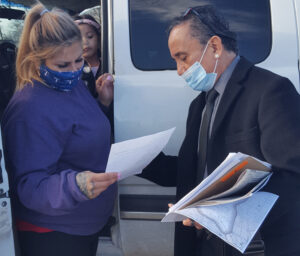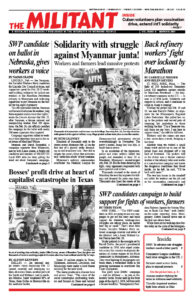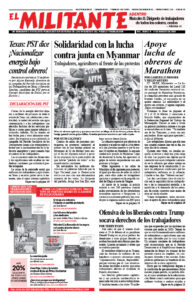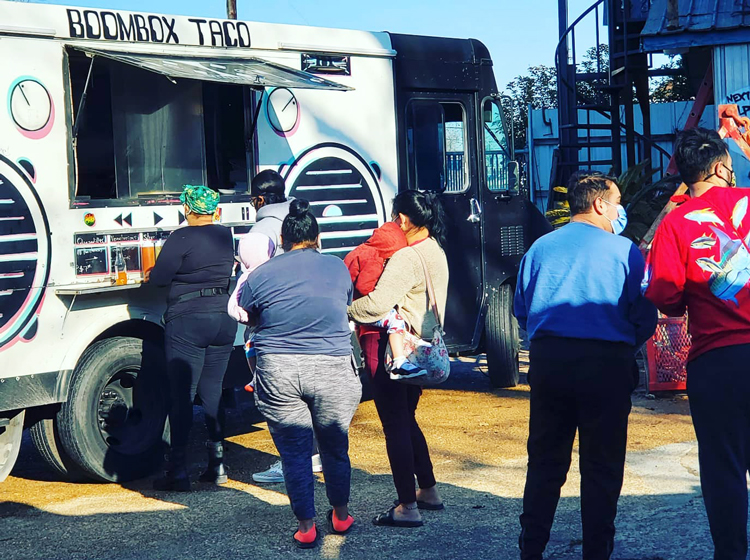DALLAS — An unusual major winter storm beginning Feb. 12 spread snowfall and damaging ice here, all across Texas, in other parts of the South and Midwest, and in northern Mexico. Snow blanketed 80% of Texas, from Dallas to Brownsville on the southern border.
Some 25 million people in Texas, Oklahoma, Arkansas, Louisiana, and Mississippi were under a hard freeze warning for the next week.
The storm produced a disaster here and across Texas. “The cause of the social catastrophe confronting workers and farmers in Texas and beyond is not the storm,” Gerardo Sánchez, Socialist Workers Party candidate for Dallas City Council, said in a statement Feb. 23, “but the dog-eat-dog capitalist system, which puts profits for the few over the human needs of the millions.

“The Socialist Workers Party says workers need to fight for workers control of all aspects of production, from the plants and refineries where we work to workers control on a state and national basis,” he said.
Temperatures plunged below 20 degrees for days and below zero at night in Texas, a state where homes and businesses are usually not winterized. Almost every energy source in the state became paralyzed, as power companies have installed little protection for subfreezing temperatures, as that cuts into profits. Ice-covered wind turbines in West Texas stopped running, 185 power generating units, including gas and coal-fired power plants, tripped offline and a nuclear unit in South Texas broke down because its water supply froze.
The Electric Reliability Council of Texas, which runs the electrical grid, began ordering power outages. “Unfortunately,” ERCOT CEO Bill Magness cynically told the press, “those have terrible outcomes for people when they have to last a long time.” By Feb. 16 over 4 million people were without heat and lights in the coldest temperatures in decades.
Thousands in Killeen, home of Fort Hood, the big military base, were without power for over a week. “I have three small children — you know I have an infant — and there was just no possible way I could keep my kids in that house any longer,” Kayla Holmes told KWTX-TV. She moved in with another family that had power.
“I’ve had a few neighbors say they are burning their dining room tables, their chairs, their beds” and making makeshift tents in their homes to stay warm, she said. There have been over 70 deaths nationwide from the freezing temperatures, more than half in Texas, but the real total won’t be known for weeks.
Now working people confront a new crisis of contaminated water, broken water pipes and water shortages. More than 14.6 million were put under a boil-water advisory.
Workers’ solidarity
Socialist Workers Party members George Chalmers and Hilda Cuzco interviewed their next-door neighbor, Patricia Madrigal, in Dallas for the Militant. The apartment complex where they live hasn’t had power or water for over a week. Madrigal gave them water out of solidarity. There have been many examples of people helping fellow workers get through the disaster.
“I have babies, I called around and nobody had water,” Madrigal said. “A friend of my husband gave us water to flush the toilets, I had to buy clean water. As for food we have cold cuts, and salads.” Without water to wash or cook with, many people are forced to resort to prepared foods and disposable dinnerware, despite the higher cost.
Before her power was restored, everybody had to wear two sweaters at night. “I got a big scare when I noticed my 4-year-old daughter Alondra’s hand was getting too cold, frozen I thought, so we wrapped it with blankets to stay warm.”
Because power companies in Texas are allowed to offer electric rates that vacillate based on demand, many workers are starting to get outrageous bills. “My uncle got a bill for $14,000, and was told that he’s got to pay it,” said Madrigal. Many contracts give the power bosses the ability to take the money for their bills directly out of your bank account.
There are three power grids in the U.S. One covers the east, another the western states, and the Texas grid covers almost all of that state. A Feb. 19 Wall Street Journal article, “The Texas Freeze: Why the Power Grid Failed,” said, “The U.S. is becoming more reliant than ever on electricity but has no perfect model for running a power market in the 21st century.”
That’s because their “model” is based on maximizing profits, not assuring power supplies.
‘Nationalize energy industry’
Sánchez, the SWP candidate for Dallas City Council, said that in addition to rebuilding after the disaster, “Working people and our unions need to fight for a federally funded public works program to put millions to work at union-scale wages repairing broken pipes, damaged homes and apartment buildings, and replacing the worn-out power systems and other infrastructure in Texas and around the U.S.
“We cannot rely on the Democrats and Republicans, the two parties of the bosses. We need our own party — a labor party based on our unions — to champion and lead a fight for the nationalization of the energy industry under workers control,” he said. “Such a fight can inspire and give confidence to working people, showing that we are capable of building a movement of millions that can draw in all those exploited and oppressed by capital to replace capitalist rule with a government of workers and farmers.”
Sánchez met Hector Benegas and his wife, Patricia Benegas, originally from Argentina, campaigning in a Walmart parking lot Feb. 21. They have lived in Dallas for over 20 years. Hector has a small trucking business and Patricia runs a day care center.
“At first my small business didn’t have power. It was restored yesterday,” he said. “Luckily there was no problem with the water.” Business has been rough, but it’s not just the weather, “the pandemic has also slowed things down,” he said.
“With the freeze I had to temporarily close the day care center for lack of services,” said Patricia Benegas.
“The capitalist rulers are taking us to a dead end since they don’t care whether workers live or die in this crisis,” Sánchez said. The couple agreed.


